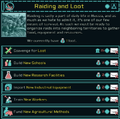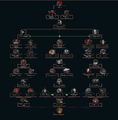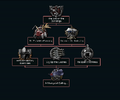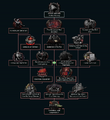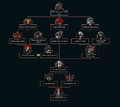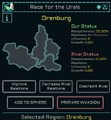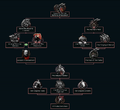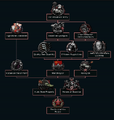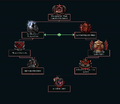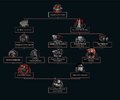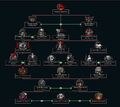West Russian Revolutionary Front/Gameplay
Initial Tree and the End of the Bombings
As a West Russian warlord, the West Russian Revolutionary Front gains access to 3 shared mechanics: Warlord Development, the Zlatoust Arms Market, and the Loot system. In Warlord Development, the player is granted several decisions, each giving a bonus to one of several different aspects of the player’s nation. The Zlatoust Arms Market allows the player to purchase several different types of military equipment to outfit their units. Finally, the Loot system allows the player to gain Loot through scavenging and raiding their neighbors, which can then be invested towards the social development of the player’s nation.
In the initial tree of the West Russian Revolutionary Front, a player is confronted with solving the famine imposed by inhospitable conditions and German terror bombings, and picking a side in the power struggle between Mikhail Tukhachevsky and Georgy Zhukov, the two strongest contenders to succeed Alexander Yegorov. After a few foci detailing the sorry state Front finds itself in, the player will complete “Pertinent Matters”, and be prompted to pick a side in the ensuing power struggle. This will introduce the player to the Succession of Yegorov mechanic, appearing in the decisions menu. This mechanic has 2 crucial aspects, influence and factionalism. Influence is split between Tukhachevsky and Zhukov, and whoever has the higher influence as shown at the top of the menu will become the successor to Yegorov, with Zhukov additionally taking power if the influence happens to be tied. Factionalism is rather displayed through text, and only changes the outcome of a few actions taken during the power struggle.
If the player were to pick Tukhachevsky, they would gain access to the left side of the focus tree, as well as several unique decisions in the power struggle. In addition to the generic decisions of meeting veterans, meeting Yegorov, and holding military parades, Tukhachevsky gains the ability to publish military theory and start a border war with Onega, increasing his influence. He additionally has the ability to sabotage Zhukov’s oil wells, however this decision should only be taken if factionalism is non-existent, as otherwise it will fail and massively boost Zhukov’s influence. In Zhukov’s portion of the focus tree, the player initially deals with strengthening Plesetsk, a pro-Tukhachevsky region of the Front, as well as strengthening the government’s control over society by enacting emergency powers and forcibly redistributing food. Afterwards, Tukhachevsky focuses on reforming the Soviet military, implementing Deep Battle Theory and blaming the Front’s military failures on Mikhail Suslov, a potential leader of Komi. Finally, Tukhachevsky intends to ready the nation for war, by securing equipment, increasing military training, and rallying the people. Within this tree, the foci “Investments in Plesetsk”, “Uphold the System”', “The Army of the International Proletariat”, and the event “The Red Bonaparte” give a moderate boost to Tukahchevsky’s influence, while “A Heroic Forty-Six Years” grants a large boost.
If the player were to pick Zhukov, they would gain access to the right side of the focus tree, in addition to many unique decisions in the power struggle. While the player gains access to the generic decisions to meet with veterans, meet with Yegorov, and hold military parades, the player that chooses Zhukov is also able to expand Zhukov’s oil refineries and deploy the Red Army to construct infrastructure. The player is also able to present evidence of Tukachevsky’s illegal activities to Yegorov, however this decision horribly backfires if factionalism is higher than non-existent. In Zhukov’s portion of the focus tree, he first moves to empower the region of Ukhta, a region where he is quite popular, while also attempting to phase out war communism. Next, he attempts to learn from the mistakes of the West Russian War, abandoning deep battle theory and autarky while attempting to learn from American doctrines. Finally, Zhukov attempts to rally the people, somewhat liberalizing the press while reminding the people of the crimes of the Germans. The foci “Investments in Ukhta”, “Meet with Yakovlev”, “Doctrinal Re-Evaluation”, “The Mistakes of the Past”, and the event “A Shanty Crew” provide a moderate boost in Zhukov’s influence, while the focus “A United Front” provides a large boost.
No matter which side the player decided to support in the power struggle, they will still gain access to the center part of the tree, dealing with the agricultural situation in the Front. The player will first attempt to alleviate the current situation by improving the system of rationing and securing additional supplies. After realizing this will still not alleviate the famine, the player will then prioritize rations for the military, while constructing additional infrastructure to improve distribution. In a final bid to alleviate the famine, the Front will then decide to reach out to a foreign partner to secure more food. The player can decide to partner with Vologda, increasing Tukhachevsky’s influence, Zlatoust, decreasing factionalism, and Komi, increasing Zhukov’s influence. No matter the player’s choice, the final foci in this tree will end the famine, removing the “Agricultural Insecurity” national spirit, and allow the player to finish the initial tree.
After finishing the tree, the German Civil War should occur quite quickly, in mid October of 1963. When the Civil War does occur, the national spirit “Luftwaffe Terror Bombing” will be removed, allowing the player to begin their next tree. After the bombings finally ends, the Front moves quickly, reestablishing organized farming, resuming full-scale industrial production, reopening mines, recovering hidden equipment, and beginning military exercises. After getting the Front ready for the coming wars, the player will complete “Arkhangelsk Calling”, which results in the death of Yegorov and the general with higher influence to take power, preparing for the upcoming SMUTA wars.
Tukhachevsky’s SMUTA Tree
If Tukhachevsky wins the power struggle, the player will gain access to a new focus tree, dedicated to dealing with the upcoming SMUTA wars. The initial focus details Tukachevsky officially becoming the Grand Marshal, giving him a few general traits and granting access to the SMUTA decision menu. This system allows the player to unite their region of Russia, in the Front’s case West Russia. The player is tasked with managing their supplies and civilian chaos, supplies allow the player to declare war on neighboring warlords, while civilian chaos prevents the player from going to war should it get too high, however the player can gain powerful bonuses at the cost of increasing civilian chaos. During the Smuta, Tukhachevsky is able to send ultimatums to his enemies prior to invasion, potentially allowing for peaceful unification, while also having access to a guaranteed peaceful integration with Gorky. During the integration of the conquered territories, Tukahchevsky executes Mikhail Suslov, executes members of the ROA and Aryan Brotherhood, spreads anti-Tsar propaganda, cracks down on all religion, and integrates ethnic minorities into the Red Army.
In his SMUTA focus tree, Tukhachevsky first has 3 short branches to go down. On the left side, Tukachevsky readies the nation for war, rallying the people behind the military, adopting strategies to avoid the failures of the West Russian War, and using SMERSH to crack down on any dissent. On the right, Tukhachevsky deals with repurposing the state to further support the military, with strict rationing enforced, with the excess going towards the military, in addition to further seizures of grain. In the center branch, Tukhachevsky deals with reorganizing the military command, promoting generals loyal to him and allowing the player to choose between integrating some warlord’s military command or not. Finally, after completing these 3 branches, Tukhachevsky pursues further centralization of Ukhta, increases quotas on workers, conducts massive war games, removes restrictions on military activity in battles, and enacts full nationalization. Should Tukhachevsky defeat all other warlords in the region, he will unlock the final focus in this tree, “Invincible and Legendary”, allowing the player to officially reunify West Russia.
Tukhachevsky’s Regional Tree, the Murmansk Revolt, and the Race for the Urals
After reuniting West Russia, the player will gain the opportunity to decide on a new capital in either Arkhangelsk, Syktyvkar, or Rykov, as well as gaining access to Regional Development, a mechanic similar to Warlord Development with different decisions. As Tukhachevsky, the player will gain access to a new focus tree, featuring 4 branches, 3 of which can only be started after completing the political branch. The political branch deals with Tukhachevsky attempting to maintain the Red Army's influence in politics, while still allowing for a proper government. The left part of this tree details Tukhachevsky reforming the Presidum, filling the ranks with civilian administrators loyal to Tukhachevsky, and encouraging former red army members to become involved with politics. Finally, this culminates in the player choosing whether to have military and civilian governance function with equal power, or to retain the military’s prominence in politics. In the central part of this branch, Tukhachevsky looks to previous Soviet politicians, specifically Trotsky, for inspiration in building his state, coming to the conclusion that he must walk his own path. The right part of this tree deals with Tukhachevsky’s attempts to retain the military as a political entity, removing disloyal generals and instating a loyalty to communism, himself, and Russia. Finally, the bottom part of this branch involves Tukhachevsky officially setting up the new government, making an official constitution and ending the administrative strain. Foci which remove the spirit “Administrative Strain” in this branch include, “Reform the Presidum”, “Politicize the Military”, “Loyalty to the Motherland”, “A Loyal Presidum”, and “A Disciplined Union”.
After completing the political branch, a new mechanic called The Race for the Urals will become available. This mechanic allows Tukhachevsky and whoever unified Western Siberia to compete over the Southern Urals. This mechanic involves the player to grow their influence in each state through various decisions, improving relations until the player can eventually puppet and annex them. The amount of influence gained is determined by the receptiveness between the 2 nations, determined by the leader of each Ural state in comparison to each Russian leader. For Tukhachevsky, Malenkov is the ideal outcome for Orenburg, while Tukhachevsky cannot negotiate with Burba at all. For Magitorosk, both Lysenko and the NKVD give equal receptiveness, while no one can negotiate with the Dirlewanger Brigade, requiring an invasion to annex him.
Roughly half a year after the unification of West Russia, midway through the political branch, the player will receive an event about a Russian revolt sitting in the Murmansk region of Finland. About a month later, the revolt will trigger, allowing for the player to send volunteers to aid the Murmansk uprising in their revolt. This will additionally enable a mechanic to prepare for a full intervention in the Murmansk Crisis, building up preparedness through various decisions before launching a full invasion of Onega and Finland. This Northern War has 3 potential outcomes depending on how well the player does, a ceasefire, ceding Onega, a compromise, ceding Onega and Murmansk, and an unconditional surrender, ceding all of Russia’s former territories, with the exception of Viipuri and Laatokan Karjala.
After the player finishes reforming the political sphere, they gain access to the other 3 branches of Tukhachevsky’s regional tree. In the economic branch, Tukhachevsky attempts to rebuild Russia’s economy through the principles of War Communism. On the left side of this branch, Tukhachevsky reckons with the legacy of the NEP, allowing the player to decide between restoring the NEP or moving forward with collectivization, as well as expanding railway networks. On the right side, Tukhachevsky deals with scaling up military production, militarizing workers, expanding resource gathering, and increasing tank production. Finally, Tukhachevsky deals with modernizing the Front’s economy through cooperation with America, importing industrial and agricultural equipment as well as taking out loans to facilitate further development in poorer areas.
In the third branch of his tree, Tukhachevsky attempts to further reform the Front’s military, now that it has moved on from warlordism. On the left part of this branch, Tukhachevsky deals with implementing his theories on military warfare. This entails ramping up tank production, rebuilding the Soviet dockyards, ensuring a unified at all levels, and constructing a small, elite air force. On the right side of the tree, Tukhachevsky questions just how the Red Army will be structured. The player is confronted with a choice, maintain a small, elite force through extensive training, or to maintain a large standing army, in which discipline is enforced at a Spartan level. Finally, no matter which decision the player makes, Tukhachevsky will unveil Project INDRIK. INDRIK involves the construction of various experimental weapons, each of which have several different outcomes, decided by random chance. The OBT, an experimental tank program, has the potential to either succeed, or partially succeed. The Izhevsk Experimental-Constructor Works, a program dedicated to modernizing rifle cartridges, similarly has the potential to succeed or partially succeed. Project Uragan, dedicated to constructing a new form of rocket artillery, has the potential to succeed, partially succeed, or remain inconclusive. Project Tsysklon, a program dedicated to constructing missiles, has the potential to succeed, remain inconclusive, or fail. Project Shchuka, dedicated to constructing electric and nuclear submarines, has the potential for a partial success, to remain inconclusive, or to fail. Project Leshiy, an effort to construct chemical weapons, has the potential to succeed, partially succeed, or to fail. Project Ferment, an attempt to construct biological weapons, can succeed, partially succeed, or fail. Finally, the center part of this branch deals with Tukhachevsky’s efforts to deal with insubordination in the army. The player is able to choose between either using positive reinforcement via rewarding heroes, or negative reinforcement via punishing failures. No matter what choice the player makes, Tukhachevsky demands his commanders to remain harsh with their units, not allowing one step back, finally finishing his military reforms.
The final branch of Tukhachevsky’s regional tree deals with the foreign policy of the Front. The player is confronted with a choice, either to align with the USA, or to try and form the Front’s own, socialist, bloc. Should the player decide to align with the USA, Tukhachevsky will attempt to gain recognition from the USA, reminding the USA of the common threat of Germany, as well as requesting oil. Should the player rather decide to cooperate with foreign socialists, they will gain access to the Comintern. The Comintern is an organization in which any socialist or communist country not already within an economic sphere can join. The Comintern allows its member states to vote on several benefits, such as allowing members to send volunteers to other members during times of war, a mutual non-aggression pact, and potentially an economic sphere. Regardless of the route Tukhachevsky decides to take, he will reaffirm the Front’s commitment to socialism and anti-fascism worldwide.
Once the player reaches 1969, the opportunity to reunite with Western Siberia will be unlocked. As Tukhachevsky, there are no opportunities to peacefully reunify, so the player must prepare for war. Similarly to the Murmansk Crisis, the player must take decisions to raise their preparedness before being able to finally invade Western Siberia. Should Tyumen manage to reunify Western Siberia, the player will gain access to Lenin’s Body, as Tukhachevsky their only option will be to preserve his body. Should the player come out on top, they will be able to reunify the Russian superregion, and gain access to their final tree.
Tukhachevsky’s Superregional Tree, and Project MOLNIYA
In Tukhachevsky’s superregional tree, he has access to only 2 branches-one political, and the other a shared nuclear tree. In his political tree, Tukhachevsky immediately declares the dissolution of the WRRF, rather proclaiming the restored Soviet Union. In the left side of this branch, Tukhachevsky deals with integrating Western Siberia, integrating the lower levels of their military while enforcing Tukhachevsky’s standardized equipment and discipline upon the newly integrated soldiers. On the right side, Tukhachevsky begins with a token gesture of restoring the VKP(b), causing no actual change. He then further enforces austerity, in order to prepare the nation and military for the upcoming unification and far-off war with Germany. In addition, he begins to allow for non-military candidates to serve in politics, as well as brutally crushing a revolt against his rule. Finally, he proclaims Dmitry Ustinov, his economic minister, as his official successor, finally finishing his political reforms.
In the shared nuclear branch, the player begins managing Russia’s up-and-coming nuclear arms program, Project MOLNIYA. While this program cannot currently be completed in-game, the player can still do much to progress it, completing theoretical development as well as resource procurement. The mechanic of Project MOLNIYA is split into 5 stages: Theoretical Development, Material Procurement, Infrastructure Reestablishment, Material Refining, and Weapon Manufacturing. Each stage must have 100% completion before moving on to the next, with the player gaining access to decisions to add boats to both progress itself as well as monthly gain.
When the player reaches 1971, they will gain the ability to reunite with Siberia, finally reunifying Russia. Similarly to his regional stage, Tukhachevsky cannot peacefully reunite with any Siberia, once again having to go to war. The mechanic to invade Siberia is functionally the same as invading Western Siberia, and should the player come out on top, they will finally reunite Russia. Should Amur have managed to unify the Far East, the player will additionally gain 4 states that would normally be owned by Manchukuo, however this is not required to reunite Russia. Once the player has reunified Russia, a news event will fire for every country, and a super event set to the tune of Invincible and Legendary will play. Finally, a few days after unification, an event detailing Operation Homecoming, Tukhachevsky’s plan to reclaim Eastern Europe from Germany, will fire, finally marking the end to Tukhachevsky’s content.
Zhukov’s SMUTA Tree
Should Zhukov win the power struggle, the player gains access to a new focus tree dealing with the upcoming SMUTA wars. During this tree, the player gains access to the SMUTA mechanic, allowing them to unite the region of West Russia. This mechanic involves the player managing 2 variables, civilian chaos and military supplies. Military Supplies allow the player to invade neighboring warlords, while civilian chaos can be increased in exchange for powerful buffs, however the player will be unable to go to war if it rises too high. As Zhukov, the player has the opportunity to peacefully integrate Gorky, as well as peacefully integrating Komi should they become Communist or Socialist. As Zhukov conquers more and more warlords, he grants autonomy to Tatars and Bashkirs, cracks down on the Church and ROA, liberates the slave camps of the Aryan Brotherhood, Executes the Tsar, and gives the player a choice between destroying Tsarist artifacts, or maintaining them for cultural purposes.
Within the focus tree itself, Zhukov begins by rallying the people to invade the other warlord states. He holds memorials for those who had fallen during the West Russian War and the subsequent bombings, using this to rally people to support the Front. Subsequently, he conducts military exercises at the border, encourages enlistment in the Red Army, and provides education for civilians on how to survive during wartimes. After all of this, the player is confronted with a choice between attempting to garner the support of the people of neighboring warlords, or attempting to utilize local communists to conduct sabotage. Should the player decide to try to garner support among the populace, Zhukov will make attempts to unite the populace, reminding the people of the common enemy of Germany, making limited concessions to opposing groups, and rejecting dogmatic anti-revisionism. Should the player instead choose sabotage campaigns, Zhukov will contact communists in enemy territories, garnering military information, stealing equipment, causing dissent, and generally causing chaos in enemy territory. Finally, no matter what route the player chooses, Zhukov will make general war-time reforms, increasing quotas on arms manufacturing, expanding rations for the military, constructing additional infrastructure, gathering stockpiles in case of emergency, and building fortifications. Once the player has annexed all opposing warlords, the focus “The Union Rises Again” can be completed, allowing the player to officially reunify Western Russia.
Zhukov’s Regional Tree, the Murmansk Revolt, and the Race for the Urals
Upon reunifying Western Russia, the player will gain access to a new capital in Arkhangelsk, Syktyvkar, or Rykov, as well as gaining access to Regional Development, expanding upon Warlord Development with new decisions. In addition, as Zhukov the player will gain access to a new focus tree, featuring a political, economic, army, and foreign policy branch. Initially, the player will only have access to the political branch, beginning with Zhukov calling upon Akhromeyev, Ryzhkov, and Yakovlev to decide upon the future of the nation, giving access to The New Soviet State mechanic. This mechanic allows the player to take decisions to empower one of the three contenders for Zhukov’s succession, along with several foci changing the balance of power one way or another. As Yakovlev, the player can reduce tariffs and abolish the Gulag system. As Ryzhkov, the player can mechanize agriculture and establish the KGB. As Akhromeyev, the player will be able to import industrial equipment and give SMERSH sweeping jurisdiction. After this mechanic is unlocked, the player is confronted with a choice, to maintain military influence in politics, empowering Akhromeyev, or transitioning to more civilian rule, empowering Ryzhkov and Yakovlev. Should the player decide to maintain the military’s influence, Zhukov will reinforce meritocracy. Should the player decide to restore civilian rule, the player will further be able to choose whether to emphasize the party, empowering Ryzhkov, or to emphasize the people, empowering Yakovlev. In addition, either way, Zhukov will restore local governments. After this, Zhukov will engage in 3 programs, to reinforce egalitarianism, restore bureaucracy, and to rebuild Soviet culture. While reinforcing egalitarianism, Zhukov will increase pensions, as well as giving the player a choice between keeping women’s rights the same, empowering Akhromeyev and Yakovlev, or giving women further rights, empowering Ryzhkov. While remaking bureaucracy, Zhukov will give autonomy to minorities, as well as giving the player a choice allowing former enemies to join, empowering Yakovlev, or continuing to repress former enemies, empowering Akhromeyev and Ryzhkov. Finally, while remaking Soviet culture, Zhukov will give funding to the arts, as well as giving the player a choice between maintaining propaganda press, boosting Akhromeyev, or liberalizing the press, empowering Ryzhkov and Yakovlev. After all of this, the player gets a choice to either stick to the traditions of the old Union, empowering Akhromeyev, or to adapt new systems, empowering Ryzhkov and Yakovlev. Should the player decide to maintain the old Union, they will be able to maintain Zhukov’s regime as it currently is, empowering Akhromeyev. Should they rather choose to accede to new voices, they will be able to introduce limited democracy, limited privatization, and a new constitution, empowering Yakovlev. No matter which option the player chooses, they will alternatively be able to delay the adoption of a constitution until the Union has been reunified, striking a middle ground and empowering Ryzhkov. Either way, the player will finally be able to remove the national spirit “Administrative Strain” by taking the foci: Restore the Administrative Divisions, Rebuild the Bureaucracy, Liberalize Appointment Criteria/Escalate De-Warlordization Trials, Uplift the Young Bureaucrats/Lessons From the Old Union, and Pluralize the System/Cement the Transition/Maintain the Regime.
Once the player makes their choice between the three options, they will gain access to The Race for the Urals. In this mechanic, the player must wage a war of influence with Western Siberia in order to puppet and eventually annex the Southern Urals. To do this, the player must increase the receptiveness of each region through various decisions, impacted by the region’s receptiveness towards the player. In Orenburg, Malenkov is the ideal candidate for Zhukov, while in Magnitogorsk the ideal candidate is the NKVD. If Dirlewanger still exists, no unifier can negotiate with him, necessitating an armed invasion.
After half a year post-reunification, the player will get an event regarding Russian tensions in the Kola peninsula. A month later, the Russian population will revolt against Finland, giving the player the opportunity to intervene. In The Murmansk Revolt, the player must take several decisions to raise their preparedness, before finally being able to declare war on Finland and Onega. Once the player manages to do this, the Northern War will begin. The player has one year to complete this, before a timer finishes and they are forcefully peaced out. The player has 3 different scenarios for peace once declaring the war. A ceasefire, in which the player is granted Onega, which is swiftly demilitarized. A negotiated peace, in which the player is granted Onega as well as the lands of the Murmansk Revolt. And an unconditional surrender, in which Finland returns all of Karelia to the player, with the exception of Laatokan Karjala and Viipuri.
Once the player concludes the political tree, they gain access to the remaining 3 branches of Zhukov’s regional focus tree. In his economic branch, Zhukov begins by announcing a return to Bukharin’s NEP. In the left part of this tree, Zhukov deals with education, funding schools and the sciences, while giving the player a choice between giving further benefits to workers, empowering Akhromeyev, or giving further benefits to the most intelligent of Russia, empowering Yakovlev and Ryzhkov. On the right side of this branch, Zhukov deals with agriculture, furthering mechanization and giving the player a choice between redistributing grain, empowering Ryzhkov, or granting subsidies for agriculture, empowering Akhromeyev and Yakovlev. In the central part of this branch, Zhukov deals with the shift away from War Communism, allowing the player to choose to either immediately transition to a planned economy, empowering Yakovlev, or to make a more gradual shift, empowering Akhromeyev and Ryzhkov. In addition, Zhukov will expand rural infrastructure and develop oil within Russia. Finally, Zhukov will come to the matter of redistribution of wealth, immediately cutting working hours down to 10 per day. The player is confronted with a choice, return to Bukharinite economics, empowering Akhromeyev and Yakovlev, or move towards workers cooperatives, empowering Ryzhkov. Should the player choose to expand workers cooperatives, Zhukov will expand motorization of the Union, as well as, if the player already has a planned economy, transitioning to a worker-controlled economy. If the player chooses to return to Bukharinite economics, they are presented with another decision between furthering industrial development, empowering Akhromeyev, or seeking foreign investment and lowering tarrifs, empowering Yakovlev.
In addition to his economic tree, Zhukov also gains access to his military tree, focusing on rebuilding the Red Army. Zhukov will begin by increasing standards on military engagements, as well as removing Tukhachevsky and his clique from military service. In addition, he will begin industrial development for military purposes, and take lessons from the SMUTA wars. Furthermore, he will prioritize quality of weapons, rebuild supply lines, establish his word as law within the military, and further develop both infantry and tank forces. Finally, Zhukov will further army professionalism and honor military heroes, proclaiming an army of the people.
Finally, Zhukov begins his foreign endeavors, and is confronted with a decision between coordination with the OFN, empowering Akhromeyev and Yakovlev, or establishing the Comintern, empowering Ryzhkov, giving the choice to the player. If the player decides to talk with the OFN, Yakovlev will be sent to DC, establishing relations and potentially a consulate. Furthermore, Zhukov will request the American government recognize the Front, as well as requesting investments and further lowering tariffs. Finally, Zhukov will request aid from the OFN, enriching the Front. Should the player instead choose to go with the Comintern, Ryzkhov will be sent on a tour of Socialist nations, approaching their governments and establishing solidarity. In addition, Zhukov will denounce the German Reich, using the opportunity to further rally the military. Furthermore, limited diplomatic overtures to the OFN will be made, before finally hosting the Rykov conference, giving access to the Comintern. In this mechanic, the player is able to invite any communist or socialist state not already part of an economic sphere. Through decisions, the player can gain access to many bonuses, such as the ability to send volunteers to member states, establish a mutual non-aggression pact, and pursue economic cooperation culminating in the creation of an economic sphere.
Upon reaching 1969, the player will be able to finally reunite the Russian Superregion. As Zhukov, the player will be able to reunify through diplomatic means should Tyumen or Batov’s Sverdlovsk unify Western Siberia, however otherwise the player will be forced to go to war. If the player is able to reunify diplomatically, they will gain access to several decisions to establish ties between West Russia and West Siberia. Each successful decision will increase receptiveness between the 2 nations, culminating in a preliminary and final conference, diplomatically unifying the 2 countries. If the player chooses to go to war, a mechanic similar to the Murmansk Rebellion will become available, presenting the player with several decisions to increase preparedness before finally going to war. Should Tyumen reunify Western Siberia, the player will gain access to Lenin’s body, with Zhukov being able to either preserve his body or simply bury it. Once the player triumphs one way or another, they will unite the Russian Superregional, granting access to Zhukov’s final focus tree. (Note: As Zhukov, ensure you complete your entire tree before moving to Superregional, as certain foci may become unavailable, preventing you from finishing his tree.)
Zhukov’s Superregional Tree, and Project MOLNIYA
In Zhukov’s superregional tree, he will gain access to 2 branches, a political branch and a shared nuclear branch. In his political branch, Zhukov immediately dissolves the Revolutionary Front, proclaiming a renewed Soviet Union. On the left part of this tree, Zhukov deals with rebuilding Russia’s economy and military. Economically, he restores civilian production, utilizes the vast building space of Russia, and furthers agricultural production. Militarily, Zhukov instates himself as a symbol of the military, ramps up patriotism, and expands military training. On the right side of the tree, Zhukov continues the political reforms made during the regional stage, either continuing military rule and banning public meetings if the player continued military rule, or officially opening the Presidum and allowing public meetings if the player transitioned to civilian rule. Finally, Zhukov officially refounds the VKP(b) and prepares the nation for the coming wars. Finally, in the center portion of this branch, Zhukov continues the foreign policy established during the regional stage, further pursuing relations with America if that was the decision, and deepening ties with socialist nations if the player chose that. Finally, Zhukov finishes his reforms, proclaiming that the red army is the strongest.
In the shared nuclear tree, Zhukov begins the Russian nuclear program, unlocking Project MOLNIYA. In this mechanic, development is split into 5 stages: Theoretical Development, Material Procurement, Infrastructure Establishment, Material Refining, and Weapon Manufacturing. In order to progress through each stage, the player must get progress to 100% on each, which can be made faster through decisions to give both static bonuses to development, and increase monthly gain. While this mechanic cannot be completed in game, the player can make significant progress, with the focus tree allowing the player to both progress Theoretical Development and Resource Procurement.
Once the player reaches 1971, they will finally gain access to the ability to fully reunite Russia. This unification works the same way as superregional unification, allowing the player to choose between diplomacy and warfare. As Zhukov, the player can only negotiate with Irkutsk and Buryatia. The reunification mechanics work the same as well, with the player either having to reach a certain amount of preparation or receptiveness before being able to finally reunify Russia. Upon reunifying the nation, the player will receive a news event and a super event, set to the tune of Army of the People. Finally, a few days after unification, the player will receive an event detailing Zhukov talking with Akhromeyev, Ryzhkov, and Yakovlev, finally putting an end to Zhukov’s content.



